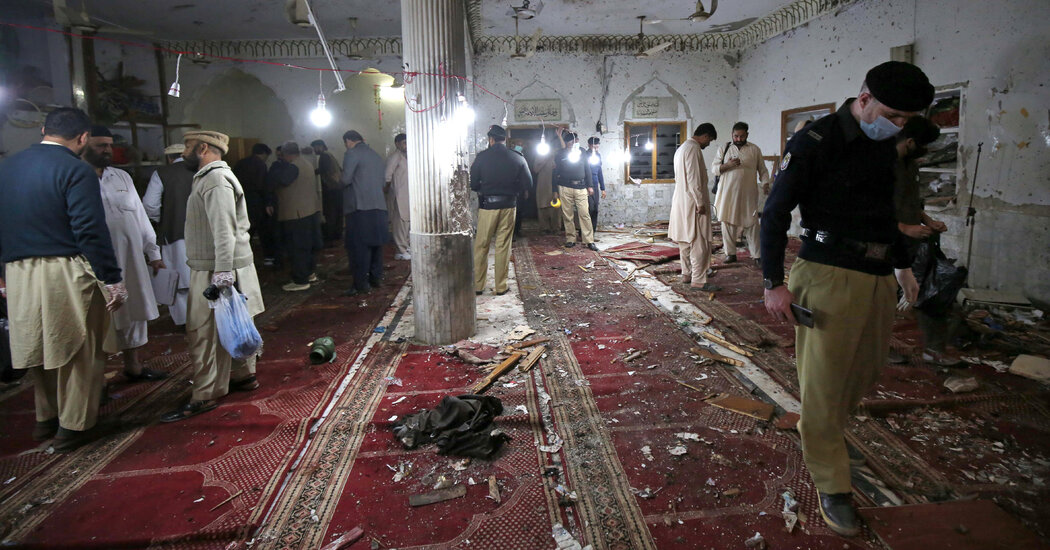
PESHAWAR, Pakistan — A bomb tore through a Shiite mosque in Peshawar, in northwestern Pakistan, on Friday, killing at least 57 people and wounding more than 100 in one of the worst terrorist attacks in Pakistan in several years.
The Islamic State’s regional affiliate, Islamic State Khorasan, or ISIS-K, claimed responsibility, according to a translation of an ISIS statement by the SITE Intelligence Group. The statement said the bombing was carried out by an Afghan suicide bomber.
The Islamic State, a Sunni Muslim terrorist group that considers Shiites heretics, has claimed several previous attacks in Pakistan but the mosque bombing was the biggest and deadliest yet.
Police officials said that at least one gunman on a motorcycle had killed two police guards before entering the mosque and detonating what appeared to be a suicide vest, while another official said there were two attackers.
The attack was one of the deadliest in years to hit Peshawar, a city of roughly two million people near Pakistan’s border with Afghanistan. In 2014, nine Taliban gunmen killed more than 140 people at the Army Public School and Degree College there.
“We are trying to figure out and determine what happened,” Moazzam Jah, the provincial police chief, said Friday.
The Peshawar police chief, Ejaz Khan, said the police had recovered pellets, empty bullet cartridges and pieces of the gun used in the initial attacks. He said there appeared to have been two assailants, both of whom had worn and detonated explosives.
Reporting From Afghanistan
“We have secured CCTV footage and will be examining it very closely,” he said.
Area residents said they heard a huge blast in the main mosque in Kocha Risaldar, a largely Shiite neighborhood that is part of centuries-old Qissa Khawani Bazaar, a former trading hub.
The police cordoned off the mosque while rescue workers took the dead and wounded to the city’s main hospital, Lady Reading.
A spokesman for the hospital, Muhammad Asim Khan, said that 10 of those people were “in very critical condition.”
Asked if they were able to identify the bodies, he said that in many cases the police had just brought severed body parts to the hospital.
“We pieced limbs together to come up with nine bodies,” he said.
Late Friday night dozens of relatives of the victims still crowded the hospital entrance hoping to learn the fate of loved ones.
One of them, Sadiq Bangash, said his 41-year-old brother had been critically wounded and his 11-year-old nephew killed.
His brother, who runs a cellphone shop in a local market near the Afghan border, had taken his son to the mosque for Friday Prayer.
“Our relatives rushed to Peshawar after coming to know about the blast,” he said.
The attack on Friday broke a relative lull in violence in Peshawar, which has borne the brunt of Taliban militancy in recent years. Sheikh Rashid Ahmed, the interior minister, called the attack an attempt to “disrupt peace and tranquillity of the provincial capital,” according to state-run news media.
Shiite groups across the country organized protests in the evening to condemn the attack.
“The Pakistani state has failed to protect its citizens, even in the mosques,” said Allama Nazir Abbas Taqvi, a Shiite religious scholar, who led a protest in Karachi.
Islamic State Khorasan announced its formation in eastern Afghanistan in 2015 and was initially led by former members of the Pakistani Taliban.
In May 2019, ISIS-K created a separate Pakistani chapter, which has carried out attacks in Baluchistan Province, targeting ethnic Hazara Shiites. In Khyber-Pakhtunkhwa Province, of which Peshawar is the capital, security forces have accused the terrorist group of targeting members of other religious minorities, including Sikhs and a Christian priest.
Last fall, ISIS-K carried out high-profile bombings at two Shiite mosques in Afghanistan, killing and wounding dozens.
The Afghan Taliban, after their rise to power in August, launched a series of operations against the group, possibly prompting its fighters to shift their operations into Pakistan, the intelligence officials said.
A second mosque attack on Friday, in Paktia Province in Afghanistan, southwest of Peshawar, killed at least three people and wounded more than two dozen after an explosive device was detonated, according to a Taliban spokesman.
Ismail Khan reported from Peshawar, and Salman Masood from Islamabad. Safiullah Padshah contributed reporting from Kabul, Afghanistan.




